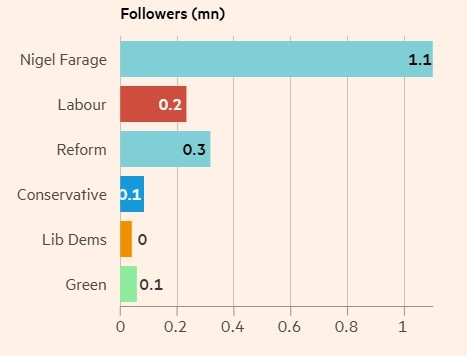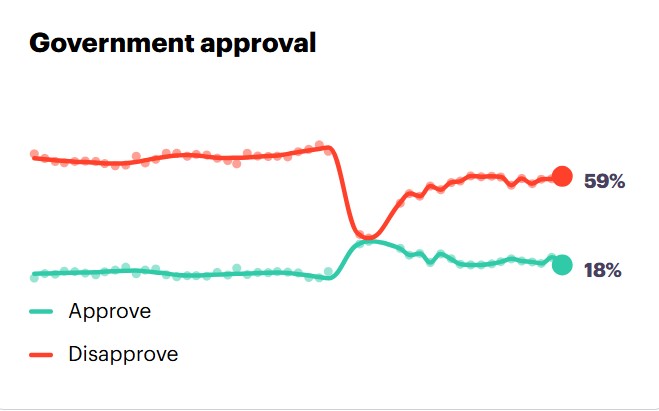Although Nigel Farage’s party, Reform UK, won only five seats in the last general election, that was only due to the peculiarities of the British first-past-the-post electoral system. The labour movement should take more notice of the fact that this party received over four million votes.
Reform is best described at this moment as a far right party, judged by its leadership and policies, but it no doubt already includes elements who are not dissimilar to fascists of the past. The party puts forward radical-sounding slogans and it has been extremely skilful in advancing these on social media and even careless left activists are frequently reposting its material because it appears to look radical. Nigel Farage personally has over a million followers on Tik-Tok, five times more than the Labour Party.

But behind Reform’s slogans on health and education, on unaffordable housing and on the neglect of pensioners – all of which can fool the unwary Facebook browser – there is the hidden subtext: that all of these social and economic ills are the fault of having ‘too many migrants’, ‘too many refugees’ and ‘woke’ culture. Farage has said that “Immigration is the number one issue in British Politics” but what he really means is, “Immigration is my means of splitting the working class, and my vehicle for coming into office and introducing more policies for the rich”.
Reform policies might start with plausibly ‘correct’ slogans, to stir up the anger of working class people, but they end up with the hooliganism and violent attacks on hotels housing asylum-seekers that we saw in August.
The meat of Reform UK policies are heavily pro-business
A look at the official policies of Reform UK show a skilful mixture of those that appear to be in the interests of workers, like ‘better’ health and social care, and pursuing unpaid taxes. But the policies that are radical-sounding don’t have a snowball in Hell’s chance of seeing the light of day were Reform to be in government, or, more likely, in coalition with the Tories.
Reform UK has already risen in the opinion polls as a result of Labour’s failure in government. It now claims to have 400 branches and more than 100,000 members. Recent opinion polls have put the party with around the same level of support as the other two main parties. One poll put them second behind the Tories, with Labour third. On July 4, Reform came second in 98 seats, 89 of which were won by Labour.

According to the Financial Times, “Ladbrokes now has Farage as 5/2 favourite to succeed Sir Keir Starmer as prime minister, ahead of Kemi Badenoch”, Tory leader. What all of this means is that Reform UK are a serious threat, come the next general election. The first-past-the-post system means a swing of 20 per cent would be needed for Farage to be the next Prime Minister, but with the electorate far more volatile than in past, even that could not be ruled out. At the very least, Reform is on a path to coalition with the Tories, particularly since Kemi Badenoch’s policies chime with those of Nigel Farage.
Neither is Reform short of money. They were recently joined by Nick Candy, a property tycoon who has given a third of a million to the Tories. They have even recruited Rael Braverman, husband of former Tory Home Secretary Suella Braverman, who is still a sitting MP and who has spoken in favour of a ‘realignment’ of the right.
Reform is confident of raising millions from rich donors
The party is confident that it will raise a lot of money from big donors like hedge fund managers and the like, even without donations from abroad like Elon Musk’s reported offer of $100mn. In sum, Reform is a serious threat to Labour’s chances in the polls: in the next general election and in local government seats as early as next May.
The real meat of Reform policy, which is largely hidden from social media posts and mainstream media, is thoroughly anti-working class, anti-green and pro-rich.
Reform favours private health care, not a public NHS. They would introduce greater harassment of Black and Asian youth by a “substantial” increase in stop and search. They would open the door to racial harassment and bias by scrapping “all Diversity, Equality and Inclusion roles and regulations”.
They give credence to the false notion of “two-tier” policing, as if peaceful pro-Palestinian marchers are the same as the far-right thugs who conducted arson attacks on hotels. “Chief Constables that allow two-tier policing”, they argue, should be “sacked”.
Reform would end the “war on drivers”
They are resolutely against any green policies: favouring “fast-tracking” North Sea gas and oil licences and opening fracking sites. Reform UK would stop the “war on drivers” by banning clean air zones (ULEZ) in cities and low traffic neighbourhoods. Targets for electrification of vehicles would be binned, as would be 20mph speed limits.
Many of the poorest working class households are in rented accommodation and they have suffered huge increases in rent in recent years, not because of migrants, but because of a shortage of affordable housing and greedy landlords. Yet the Reform UK policy reads like a charter for landlordism. They would “restore landlords’ rights to deduct finance costs and mortgage interest from tax on rental income”. They would “Abolish the Renters’ (Reform) Bill” that is aimed to deal with no-fault evictions and landlords who allow their properties, to become damp and almost uninhabitable. This is what Reform stands for.
Reform is a party for big business and the rich: no-one else
Behind the pro-worker rhetoric, Reform UK is a party for big business. Given the chance, they would do away with all the accumulated rights of workers, like the minumum wage, holiday and sick pay, maternity leave, health and safety regulations and workers’ rights in general. To quote their manifesto, they would “Scrap thousands of laws that hold back British business and damage productivity, including employment laws. We must make it easier to hire and fire so that businesses can grow”.
Given that their policies are completely reactionary, we have to ask the question how it is that there has been a swing of support for Reform? It is undoubtedly due in part to the national press and mainstream media consciously hiding the main elements of Reform policy. Like reform, the gutter press focus incessantly on the ‘small boats’, as if the desperate people in them were a significant part of the UK economy. The BBC seems to have given Nigel Farage a season ticket for programmes like Question Time, so he can showboat as often as he likes as a ‘man of the people’.
But it is more than that. Reform’s success is due to the failure of the Labour leadership to address the concrete issues that most concern ordinary households. Support for Reform springs from exactly the same causes as support for its predecessor party, the Brexit Party. Four million votes for Reform, like the majority vote for Brexit, have a political logic that is not difficult to understand.
Many workers have felt ‘left behind’
Because of the historic failure of the Labour Party – both in government and at a local level – to tackle first and foremost the problems facing working class people, large sections of the least well off have felt permanently ‘left behind’. Added to that is the perception that important decisions are taken over their heads, without any consultation, and often in offices and boardrooms far away.
In everyday life, workers are facing a greater sense of insecurity and uncertainty than ever before – and far more than their parents did – and that applies with regard to education, health, housing, low pay and living standards in general. The perception of a ‘threat’ from large numbers of migrants, although it is a false perception, is whipped up by the media and the likes of Farage, to further fuel the fears of an uncertain and unstable future.
Winter fuel allowance cut extremely unpopular
A Labour government, therefore, which fails to deal with these issues will only increase the feelings of insecurity and uncertainty that feeds support for Reform. Unfortunately, looking at Starmer’s first five months in office – particularly the budget and the cut of winter fuel allowance – does not fill anyone with any confidence. It is clear that the policies of Rachel Reeves and Keir Starmer will not make a dent on the problems workers face. In fact, many of them will get worse.
Starmer, Reeves and government ministers seem to bend over backwards to listen to business leaders and lobbyists. Any policy they put forward, which might have had any positive content – like new rights for workers – is threatened with being watered down in the interests of profit. The only people Starmer is not listening to are working people, and that is partly because key trade union leaders are for the moment looking the other way, while the Prime Minister and Chancellor sharpen the axes for more austerity.
There is hardly a demographic group that Keir Starmer already hasn’t alienated or is about to alienate in the coming few months: pensioners, welfare claimants, farmers, civil servants, NHS workers, teachers, lecturers, and not least young voters who are concerned about the genocide in Gaza, or climate change or more general social and economic issues.

According to YouGov, the approval rating of the government is now -41%, which must be a record for a government less than six months in office (chart left). The policies of the Labour leadership are tailor-made to produce a swing to Reform.
Perhaps it will take the experience of a collapse in Labour support in the local elections, and the demands of their increasingly discontented members, to make the leaders of affiliated trade unions to begin protest about the direction of the Labour Party.
Even if there may be a swing to the right among the electorate as a whole – and that is a strong possibility – within the labour movement, among those activists who are its indispensible bedrock, there is likely to be a swing in the other direction, to the left.
What can give us some grounds for optimism is that there are yet many the Labour Party, but particularly, and most significantly, in the affiliated unions, who will not tolerate indefinitely a ‘Labour’ government that follows Tory austerity with their own version.
At some point, outright opposition to the strategy of Starmer and Reeves will begin to develop, particularly in the labour movement, where the grip of the right wing is tenuous at best. That opposition, and a new surge towards organising for socialist ideas and policies in the interests of workers, is the only way to beat the parties of the right and far right.
Top picture of Farage from Wikimedia Commons here
[This article was corrected on December 15, to remove an incorrect graphic on seats where Reform UK came second in England and Wales]




Proof here. Safe council seat in St Helens goes to Reform. The unions and grass roots need to act now to avoid electoral wipe out.
https://www.sthelensstar.co.uk/news/24794473.reform-uk-st-helens-branch-celebrates-by-election-win-blackbrook/